Neurology Residency
Research and Scholarly Activities
Adult Neurology Residency Program – Faculty Research
At UC Davis, all residents are strongly encouraged and supported to pursue scholarly activities. Scholarship activities allow residents to nurture intellectual curiosity for lifelong learning skills, become critical evaluators of medical literature and develop skills for fellowship and academic practice. Residents may choose to enter our formal research track or pursue alternative scholarly activities such as quality improvement and/or education program development; in addition, the R25 program is available for those seeking careers in academic neurology and provides a more intensive research experience.
We provide both academic and financial support for residents attending regional and national scientific meetings, such as the American Academy of Neurology and other subspecialty meetings, where they can present their scholarly work.
Meeting opportunities include: American Academy of Neurology, American Epilepsy Society, American Clinical Neurophysiology Society, American Headache Society, American Academy of Sleep Medicine, Actrims Forum, Annual Focus of Common Movement Disorders, International Stroke Conference, Neurocritical Care Society.
Research Track
Residents are given the opportunity to join our formal research track during the second half of their internship year. During this first year, Neurology PGY-1 residents will complete a structured intern research curriculum. Interns will work with Dr. Michael Schivo of Internal Medicine and Drs. Kwan Ng and Michael Rogawski of Neurology to design a feasible, interesting and relevant research project. Residents will be assigned a research mentor who can support the residents research project through completion.
Residents will start the research curriculum during their ambulatory time during PGY-1. This will prepare them for research block electives (up to one month per year) during each of their second, third and fourth years.
Residents in the research track will have the opportunity to:
- Learn fundamentals of research methodology and study design
- Meet individually with the medical librarians to enhance their skills in library resources
- Study research ethics and human subject protection
- Collaborate with biostatisticians and information technology experts (Clinical and Translational Science Center)
- Explore electronical health record-based research
- Learn to use reference management software (i.e. RedCap)
- Review methodology for systematic literature review
- Develop a research project and submit an IRB for their research proposal
UC Davis Clinician Neuroscientist Development Program
The UC Davis Clinician Neuroscientist Development Program offers neurology residents who may be interested in careers in academic neurology the opportunity for a 6-month mentored research experience, usually conducted in PGY-4. Residents seeking to enter the program will work with a research mentor during PGY-2 and PGY-3 to plan a research project with the goal of submitting a brief research proposal to the National Institute of Neurological Disorders and Stroke (NINDS) in October of PGY-3. Residents who successfully complete the 6-month experience during residency may obtain one to two years of salary support during fellowship. The directors of the program are Dr. Griffith R. Harsh, IV, Professor of Neurological Surgery, and Dr. Michael A. Rogawski, Professor of Neurology. Neurology residents with questions about the program may contact Dr. Rogawski at rogawski@ucdavis.edu. The program is funded by a grant from NINDS (R25NS124520).
-

Maria Florendo, M.D. - R25 Grant Recipient
As an aspiring Movement Disorder specialist, I am interested in developing disease modifying therapy for neurodegenerative diseases such as Huntington Disease. Therefore, my research will focus on delivery systems for gene therapeutics that can alter the disease rather than just providing symptomatic relief. The R25 grant allows me to pursue this interest during residency and fellowship. I am grateful to have the support of the UC Davis Neurology Residency Program in my pursuit of becoming a clinician scientist.
